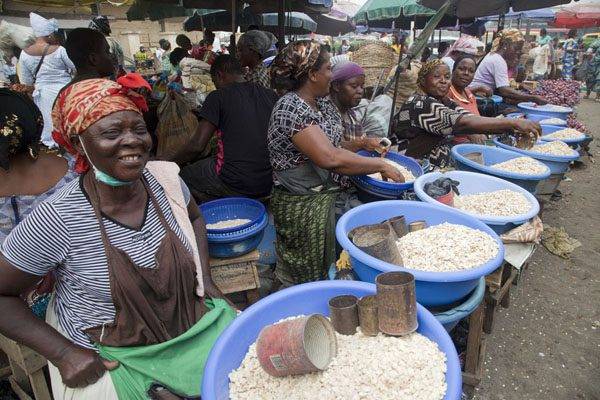This Is What Is Happening To Food Prices In Nigeria 3 Weeks After Gov’t Opted To Partially Close Border

One of the reasons behind the partial closure of the Seme Border was to stop the import of food and encourage consumption of locally-sourced food. But a scarcity of locally-sourced food is now causing rising food prices in Nigeria.
A couple of weeks ago, the Nigerian government partially closed its own end of the border with the Republic of Benin, without as much as a prior warning. Now food prices are soaring and the hike is biting hard.
According to government sources, the partial border closure was a move aimed at curbing smuggling and wanton imports of illicit products into Nigeria via the Seme Border. It was also targeted at intercepting illegal exports of petroleum products from Nigeria to neighbouring countries.
In recent months, the President Buhari-led administration had been waxing lyrical about cutting down on importation of various products, especially those produced locally.
The government had even directed the Central Bank of Nigeria (CBN) to place restrictions on forex intended for food imports. And the partial closure of the Nigeria-Benin border did seem like another chapter from that playbook.
But it looks like the whole plan is yielding an undesirable effect. In the few weeks since the border closure, the prices of food and other commodities in local markets have increased significantly, and traders are unanimous in their claim that the partial border closure is responsible for the trouble.
In a visit to Oyingbo Market, a popular food market in Lagos, WeeTracker learnt from several buyers that food has become costlier and even the price of locally-sourced products has increased.
For example, a 50kg bag of homegrown rice — a popular Nigerian staple — which used to go for NGN 14 K just a few weeks ago is now sold for between NGN 16 K and NGN 17 K, with some others going for as high as NGN 18 K.
Similarly, the prices of livestock products and seafood have also witnessed increases of their own, and some of those are not even readily available. And as would be expected, the scarcity of these products can only mean one thing — higher price tags on the few available.
The traders in the market blamed the price hike on the partial border closure. One trader, who simply supplied her name as Chinwe, told WeeTracker that it is now difficult to get things into the country from the border and that has put pressure on the few available locally.
“Even local rice is now expensive. Products aren’t coming in as they used to and the price of everything has increased,” she said.
It’s pretty much the same story in many other parts of Lagos, and indeed, other parts of the country, where people are now calling for the government to put an end to the imminent full-fledged inflation, as it would make things a lot harder for ordinary Nigerians who are already battling harsh economic conditions as it is.
The partial closure of the border is followed by a joint border security exercise ordered by the government and aimed at securing the country’s land and border.
It is also an attempt to check rice smuggling amidst other goods that are brought into the country from neighbouring countries and as well to promote local farm produce within the country.
On that note, the Nigerian government does score points for intentions. By the look of things, improving local production and consumption of locally-sourced products by cutting off external sources is a good move. But it’s not that simple.
And if the current realities are anything to by, then maybe the entire food supply chain in Nigeria is in need of an overhaul.
Featured Image Courtesy: Travel Adventures